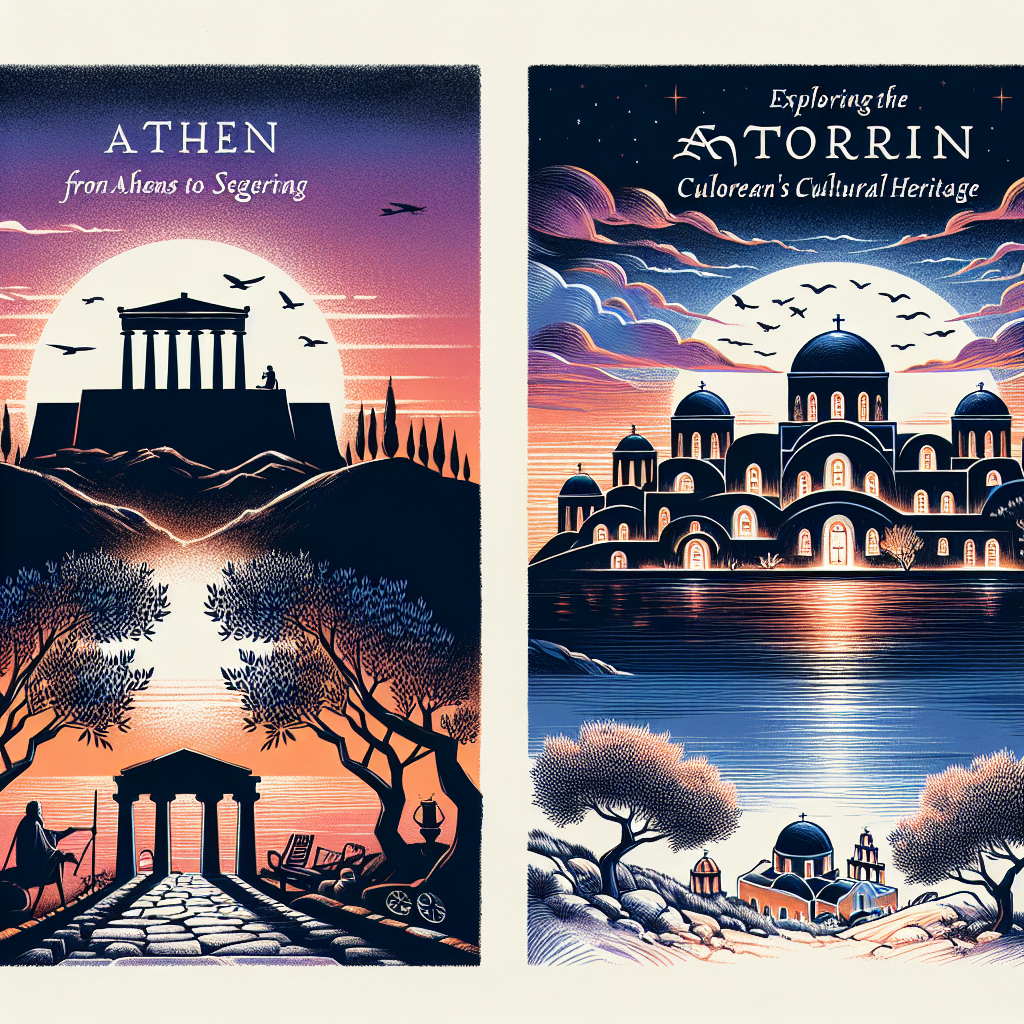The Aegean Sea is a blend of azure waters, rugged coastlines, and a tapestry of ancient history woven into the heart of Greece. Among the myriad islands and the bustling mainland, Athens and Santorini stand out not only for their breathtaking landscapes but also for their rich cultural heritage. This journey from Athens to Santorini is not merely a traversing of space but an exploration of time, where each step echoes with centuries of civilization.
Athens: The Cradle of Western Civilization
Athens, often regarded as the cradle of Western civilization, is a city where antiquity meets modernity. Its skyline is dominated by the iconic Acropolis, a UNESCO World Heritage site that serves as a testament to ancient Greek architecture and ingenuity. The Parthenon, dedicated to the goddess Athena, tells tales of worship, democracy, and the arts. A visit to this ancient citadel is a must for any traveler wishing to understand the heartbeat of Classical Greece.
Walking through the ancient Agora, the philosophical heart of Athens, one can almost hear the echoes of Socrates and Plato as they engaged in passionate debates about morality, politics, and the human condition. The nearby Temple of Hephaestus, just as impressive as the Parthenon but often overlooked, offers a glimpse into the devotion of the ancient Athenians.
Beyond the historical sites, modern Athens pulses with life. The vibrant neighborhoods of Plaka and Monastiraki offer a juxtaposition of past and present, featuring boutique shops, street art, and culinary delights that reflect both traditional Greek and contemporary cuisines. The city’s cafes buzz with conversation, where locals and visitors alike gather to indulge in rich Greek coffee and pastries like baklava.
The Journey to Santorini
After soaking in the sights and sounds of Athens, travelers typically embark on a ferry or a short flight to Santorini, one of the most stunning islands in the Aegean. The journey itself is a captivating experience, with the boat cutting through sparkling waters and providing a backdrop of numerous islands, each with its unique charm.
As the caldera of Santorini comes into view, characterized by towering cliffs and whitewashed buildings cascading down to the sea, one cannot help but feel a sense of awe. The island is the remnants of a massive volcanic eruption that occurred around 1600 BC, creating a natural harbor that has become a hotspot for tourists.
Santorini: A Volcanic Gem
Santorini’s charm lies not only in its dramatic landscapes but also in its rich cultural heritage. The archaeological site of Akrotiri, often referred to as the "Pompeii of the Aegean," offers a glimpse into a highly advanced Minoan settlement that thrived before the catastrophic eruption. The well-preserved frescoes and multi-storied buildings showcase the artistic achievements and daily life of the Minoans, hinting at a sophisticated society that practiced trade and the arts.
The island is also renowned for its wine, particularly the Assyrtiko grape that thrives in the volcanic soil. Wine tasting tours are a popular activity, allowing visitors to savor the unique flavors while overlooking the stunning sunsets that Santorini is famous for. The village of Oia, with its iconic blue-domed churches, becomes bathed in golden hues as the sun dips below the horizon, providing a picturesque end to the day.
Cultural Festivals and Local Traditions
Both Athens and Santorini celebrate their cultural heritage through festivals and local traditions that illuminate the vibrant spirit of Greece. In Athens, the Athens Epidaurus Festival showcases the enduring power of ancient Greek theater, presenting performances of classic plays in their original amphitheaters. Santorini, on the other hand, hosts the Santorini International Music Festival, honoring the island’s artistic contributions through various concerts that feature both local and international artists.
Local culinary traditions also play a significant role in both destinations. In Athens, the Taverns serve traditional dishes such as moussaka and souvlaki, while Santorini is famous for its fresh seafood and fava beans. Participating in a cooking class offers a delightful immersion into Greek gastronomy, showcasing how food serves as a cultural bridge between generations.
A Journey of Discovery
Traveling from Athens to Santorini is more than just a passage through beautiful landscapes; it’s a profound journey of cultural discovery. Each site visited, each meal savored, and each conversation shared contributes to a deeper understanding of Greece’s rich tapestry of history and modern life. The lasting impact of ancient philosophers, revered artists, and resilient communities can be felt in every corner of these iconic destinations.
In the end, the Aegean’s cultural heritage invites travelers to walk in the footsteps of those who came before, allowing them to experience the grandeur, beauty, and spirit that has defined this remarkable region for millennia. Whether exploring the ancient ruins of Athens or savoring the beauty of Santorini’s sunsets, the journey through Greece’s cultural landscape is indeed unforgettable.
